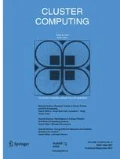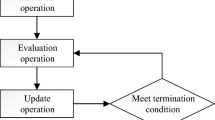Abstract
Swarm intelligence inspired algorithms have so many profound natural advantages in solving large-scale and distributed problems. This paper systematically analyzes the characteristics of wolves’ behaviors such as cooperative searching, hunting and attacking, and further abstracts those behaviors into four basic ways, that is, wandering, summoning, lurking and besieging, in accordance with the different roles of wolves. Then, we formulate a cluster cooperative rule based on the principle of Dynamic Wolf Head Alternation and Real-time Role Assignment, and propose a fatigue-rendering tactics based on interception strategy in two teams. Finally, the clustering cooperative rule enlightened by the group’s behavior is established, and the convergence of the algorithm is proved with the Markov asymptotic convergence theory. Experiments show that the model can effectively guarantee the efficiency of solving large-scale complex optimization problems and the operational effectiveness of distributed cluster cooperative attack problems.







Similar content being viewed by others
References
Beheshti, Z., Shamsuddin, S.M.: Non-parametric particle swarm optimization for global optimization [J]. Appl. Soft Comput. 28(1), 345–359 (2015)
Sudholt, D.: Theory of swarm intelligence[C]. In: Conference Companion on Genetic and Evolutionary Computation, pp. 1215–1238. ACM (2012)
Li, W., Bi, Y., Zhu, X., et al.: Hybrid swarm intelligent parallel algorithm research based on multi-core clusters[J]. Microprocess. Microsyst. 47, 151–160 (2016)
Ma, L., Zhu, Y., Zhang, D., et al.: A hybrid approach to artificial bee colony algorithm[J]. Neural Comput. Appl. 27(2), 387–409 (2016)
Yang, X.S.: Swarm intelligence based algorithms: a critical analysis [J]. Evol. Intel. 7(1), 17–28 (2014)
Yi-Mao, Y.E., Zhao, H.S., Jin, L.: A hybrid optimization algorithm based on particle swarm optimization algorithm and artificial bee colony algorithm [J]. J. Guangxi Univ. Natl. (2013)
Mohan, B.C., Baskaran, R.: A survey: Ant Colony Optimization based recent research and implementation on several engineering domain [J]. Expert Syst. Appl. 39(4), 4618–4627 (2012)
Lin, K.C., Chen, S.Y., Hung, J.C.: Feature selection for support vector machines base on modified artificial fish swarm algorithm [M]. In: Ubiquitous Computing Application and Wireless Sensor, pp. 297–304. Springer, Dordrecht (2015)
Muro, C., Escobedo, R., Spector, L., et al.: Wolf-pack (Canis lupus) hunting strategies emerge from simple rules in computational simulations[J]. Behav. Proc. 88(3), 192–197 (2011)
Huan, Zhou, Hui, Zhao, et al.: Cooperative flight and evasion control of UAV swarm based on rule[J]. Syst. Eng. Electron. 38(6), 1374–1382 (2016)
Weitzenfeld, A., Vallesa, A., Flores, H.A.: Biologically-inspired wolf pack multiple robot hunting model [C]. In: Lars’06, Robotics Symposium, IEEE, Latin American, pp. 120–127. IEEE (2007)
Jun-Hua, L.I., Ming, L.I.: Convergence analysis and convergence rate estimate of cellular genetic algorithms [J]. Pattern Recognit. Artif. Intell. 25(5), 874–878 (2012)
Galletly, J.: Evolutionary algorithms in theory and practice [J]. Complexity 2(8), 26–27 (1996)
Zhou, X., Gao, D.Y., Yang, C.A.: Comparative study of state transition algorithm with harmony search and artificial bee colony [J]. In: Proceedings of The Eighth International Conference on Bio-Inspired Computing: Theories and Applications (BIC-TA), vol. 212, pp. 651–659 (2012)
Hu, M., Wu, T., Weir, J.D.: An Intelligent Augmentation of Particle Swarm Optimization with Multiple Adaptive Methods [M]. Elsevier Science Inc., New York, (2012)
Motiian, S., Soltanian-Zadeh, H.: Improved particle swarm optimization and applications to Hidden Markov Model and Ackley function [C]. In: IEEE International Conference on Computational Intelligence for Measurement Systems and Applications, pp. 1–4. IEEE 2011
Tang, Q., Shen, Y., Hu, C., et al.: Swarm intelligence: based cooperation optimization of multi-modal functions [J]. Cognit. Comput. 5(1), 48–55 (2013)
Parpinelli, R.S., Teodoro, F.R., Lopes, H.S.: A comparison of swarm intelligence algorithms for structural engineering optimization[J]. Int. J. Numer. Meth. Eng. 91(6), 666–684 (2012)
Caamaño, P., Bellas, F., Becerra, J.A., et al.: Evolutionary algorithm characterization in real parameter optimization problems[J]. Appl. Soft Comput. 13(4), 1902–1921 (2013)
Wu, J., Jing, Z., Li, R., et al.: A multi-subpopulation PSO immune algorithm and its application on function optimization [J]. Journal of Comput. Res. Dev. 49(9), 1883–1898 (2012)
Acknowledgement
The research is supported by National Aviation Foundation of China No. 2016ZC15012.
Author information
Authors and Affiliations
Corresponding authors
Rights and permissions
About this article
Cite this article
Liang, W., He, J., Wang, S. et al. Improved cluster collaboration algorithm based on wolf pack behavior. Cluster Comput 22 (Suppl 3), 6181–6196 (2019). https://doi.org/10.1007/s10586-018-1891-y
Received:
Revised:
Accepted:
Published:
Issue Date:
DOI: https://doi.org/10.1007/s10586-018-1891-y




